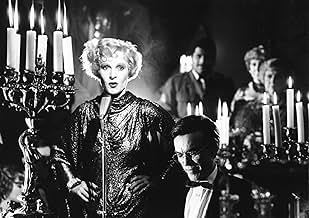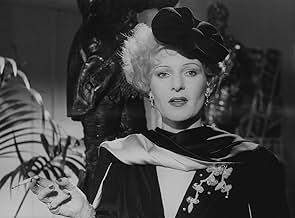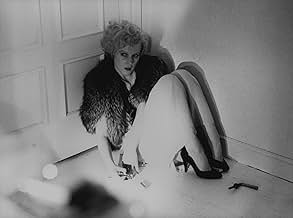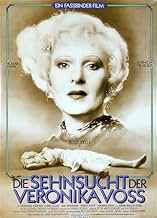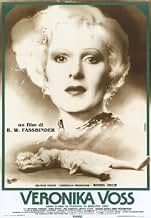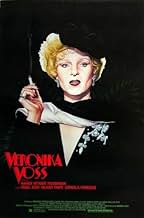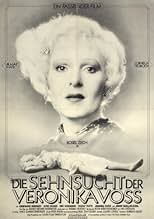Añade un argumento en tu idiomaPartially based on the life of Sybille Schmitz, who found fame under the Nazi regime, but whose career was destroyed afterward. Veronika Voss is a once prominent UFA actress, kept by her doc... Leer todoPartially based on the life of Sybille Schmitz, who found fame under the Nazi regime, but whose career was destroyed afterward. Veronika Voss is a once prominent UFA actress, kept by her doctor, who raises suspicion in a sports journalist.Partially based on the life of Sybille Schmitz, who found fame under the Nazi regime, but whose career was destroyed afterward. Veronika Voss is a once prominent UFA actress, kept by her doctor, who raises suspicion in a sports journalist.
- Dirección
- Guión
- Reparto principal
- Premios
- 4 premios y 4 nominaciones en total
- G.I.
- (as Günter Kaufmann)
- …
Reseñas destacadas
The plot is decent; it would have been a really good one for a classic Hollywood film starring Joan Crawford or Bette Davis or someone like that. Its greatest worth is in the performance of Rosel Zech, who has the titular role. Cornelia Froboess as Robert's girlfriend and Annemarie Düringer as the wicked doctor are also good. The character of Robert is never very interesting. The black and white cinematography (Xaver Schwarzenberger) and the unconventional score (Peer Raben) are very good. The tape I watched was not in a very good condition, so I may have liked it more if I had seen a better copy. 8/10.
It is hard to say if the main focus of this movie is the former UFA-star Veronika Voss or the sports reporter Robert Krohn. One rainy night, he meets, in a little forest amidst of Berlin, a crying little bundle of mensch who seems to have completely lost her orientation. She is not so much thankful for his help but astonished that he does not recognize her: the great Veronika Voss. After he accompanies the woman to her door, she continues to occupy his mind. He asks his older colleagues who confirm him that she was once a movies' super-star, but now forgotten, divorced, impoverished, addicted and out of work. Soon, they meet again, and between Krohn, who is in a steady liaison, and Veronika, who sees in him one of her once many admirers, a very problematic love story starts which costs two humans' lives, leaves an investigative mind back in despair, discloses the corruption between medicine and politics and portrays the deterrent situation in the post-war German film industry which used his former flagships as fuel.
R.W. Fassbinder got for this films the "Golden Bear" out of the hand of Jimmy Stewart who was his friend for many years. Fassbinder had been nominated for the highest German film price since a long time, but it was Stewart who realized that soon it might come too late. Fassbinder passed away only a few days after having received the Golden Bear.
It is beautifully written by his regular collaborators Peter Marthesheimer and Pea Froelich, shot in knife-like black and white by his preferred cinematographer Xavier Schwarzenberger and as one would expect from this director, features a strong leading role for an actress, in this case Rosel Zech, whose character is loosely based upon that of the fascinating but tragic Sybille Schmitz who despite never being fully accepted by Herr Goebbels and company found it virtually impossible to continue her post-war career because of her perceived Nazi connections and whose drug-fuelled downward spiral ended in suicide in 1955.
Zech is simply stupendous in a demanding role that requires a wide range of emotions and as a bonus she performs a beguiling, Dietrich-like rendition of 'Memories are made of this." As a lesbian Dr. Feel-good, there is a magnificently chilling performance by Annemarie Dueringer. The entire cast is uniformly excellent and all of the characters are well drawn. Armin Mueller-Stahl again makes his presence felt whilst the influence of America in the Germany of the time is epitomised by the sound track and not least by the presence of the ubiquitous African-American GI played as always by Guenter Kaufmann. As well as being a tribute to the mighty UFA Studios, the relationship between fading star Voss and the journalist of Hilmar Thate is a nod to 'Sunset Boulevard'.
There is an absence of socio-political comment here and the whole enterprise succeeds solely through the myths of the movies. Fassbinder was an avowed devotee of the dream factory that was Hollywood and professed his adoration for Douglas Sirk. As it happened the master long outlived the pupil and Sirk offered a fitting tribute:"Although his fims were controversial.....only those things that survive opposition have the power of permanence."
¿Sabías que...?
- CuriosidadesBased on the true story of German film star Sybille Schmitz.
- PifiasThe film is set in 1955 but the song "The Battle of New Orleans" by Johnny Horton, released in 1959, is heard on the radio a number of times.
- Citas
Dr. Marianne Katz: Artists are different from ordinary people. They are wrapped up in themselves, or simply forgetful.
Selecciones populares
- How long is Veronika Voss?Con tecnología de Alexa
Detalles
Taquilla
- Presupuesto
- 2.600.000 DEM (estimación)
- Recaudación en Estados Unidos y Canadá
- 8144 US$
- Fin de semana de estreno en EE. UU. y Canadá
- 11.623 US$
- 16 feb 2003
- Recaudación en todo el mundo
- 8158 US$
- Duración
- 1h 44min(104 min)
- Color
- Mezcla de sonido
- Relación de aspecto
- 1.66 : 1

